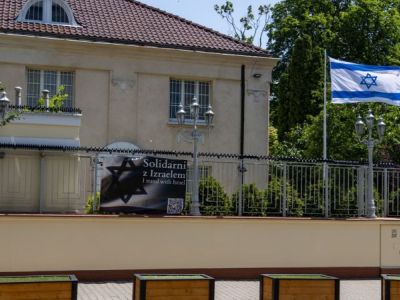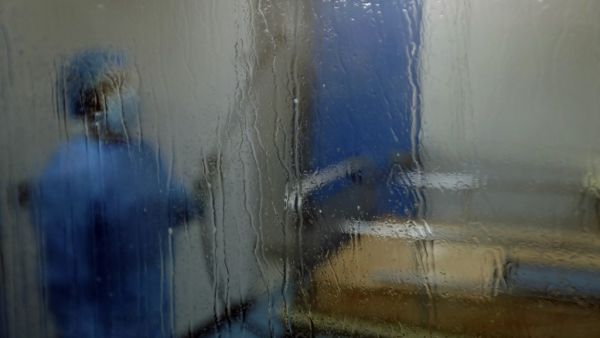UN agencies and humanitarian aid groups have stepped up precautionary measures to prevent the spread of the novel coronavirus inside Lebanon’s Palestinian and Syrian refugee camps, which often lack access to adequate water and sanitation.
Hundreds of thousands of Palestinian refugees live in overcrowded and rundown camps in Lebanon, which is also home to at least 1.5 million Syrians who have fled the war next door.
The UN Refugee Agency (UNHCR) has been ramping up efforts to raise awareness about basic hygiene among the Syrian refugee communities.
“Since early February we’ve been leading mass information and awareness raising campaigns and have launched a series of precautionary hygiene activities in all locations where refugees live in overcrowded conditions,” said UNHCR spokeswoman Lisa Abou Khaled. “We are also distributing additional hygiene materials like soap and other cleaning products for refugees.”
Abou Khaled said no confirmed COVID-19 cases have been registered among the Syrian refugees, most of whom live in informal tented encampments.
However, she said the agency has set up “isolation centres” inside the camps in the event quarantines are needed.
“Since self-isolation is so important and it may be difficult for people who live in crowded tents, we are setting up places for them to be able to self-isolate, either through erecting new tents for them near the camps or equipping existing structures which are currently empty,” Abou Khaled said.
“We are also working with the ministry of public health to support hospitals. We will create additional wards with additional beds, including additional intensive care units so there is sufficient response capacity for all communities, Lebanese and refugees,” she added.
So far, just one Palestinian and three Syrians, all of whom live outside the camps, have tested positive for COVID-19, out of 548 infections and 19 deaths across Lebanon.
UNHCR is also working to raise awareness among Syrian refugees about the virus’s symptoms and how they can contact the ministry of public health hotline for screening. The ministry has committed to paying for any testing and treatment services for the virus.
Similar measures are being applied by the UN Relief and Works Agency that cares for Palestinian refugees (UNRWA) in 12 overcrowded camps across Lebanon.
The agency has converted its vocational and technical training centre in south Lebanon into a medical facility to treat potential coronavirus patients.
“The purpose is to provide a centre where mild cases of coronavirus would be treated in case hospitals have no capacity and where isolation at home is not possible,” said UNRWA spokesperson Huda Samra. “We have also identified other UNRWA installations at camps’ level that can be turned into medical isolation centres.”
UNRWA, which provides educational and medical services for Palestinian refugees, has taken a number of protective measures in its clinics inside the camps.
“Daily disinfection is taking place in all our clinics and medical staff have been equipped with the needed personal protective equipment (PPE) and received the training needed on prevention and handling of cases,” Samra said.
“We have also adjusted our health centres’ mode of operation by introducing appointments for everyone to reduce the inflow of people and postponed all non-emergency consultations.”
“The main concern remains… the spread of the coronavirus in the overcrowded Palestinian refugee camps where there are very limited possibilities for home isolation,” Samra added.
Other humanitarian actors have taken measures to help stem the virus.
The Norwegian Refugee Council said it had increased water deliveries and supplied soap and bleach to Palestinians and Syrians. Cars mounted with loudspeakers have been making the rounds at Palestinian camps, broadcasting messages about the importance of hand washing and not touching one’s face.
Fears that the COVID-19 pandemic could exacerbate discrimination against refugees in Lebanon were voiced by Human Rights Watch (HRW), which cited restrictions on movement imposed on refugees in several municipalities.
“At least 21 Lebanese municipalities have introduced discriminatory restrictions on Syrian refugees that do not apply to Lebanese residents as part of their efforts to combat COVID-19,” HRW stated.
“There is no evidence that extra curfews for Syrian refugees will help limit the spread of COVID-19,” said Nadia Hardman, refugee rights researcher at HRW. “The coronavirus does not discriminate and limiting the spread and impact of COVID-19 in Lebanon requires ensuring that everyone is able to access testing and treatment centres.”
Palestinians, like many Syrian refugees, often live off of daily wages. Now under a nationwide lockdown that has battered the economy and halted their access to job, refugees are in desperate need of additional aid.
As part of an emergency relief plan, the agency “will be distributing some limited cash assistance in the coming weeks,” Samra said.
Lebanese President Michel Aoun has appealed for financial assistance from international donors, saying the international community has a responsibility to help Lebanon shoulder the burden of hosting scores of Palestinian and Syrian refugees and warning of a “health catastrophe if the virus hits refugee camps.”
This article has been adapted from its original source.










